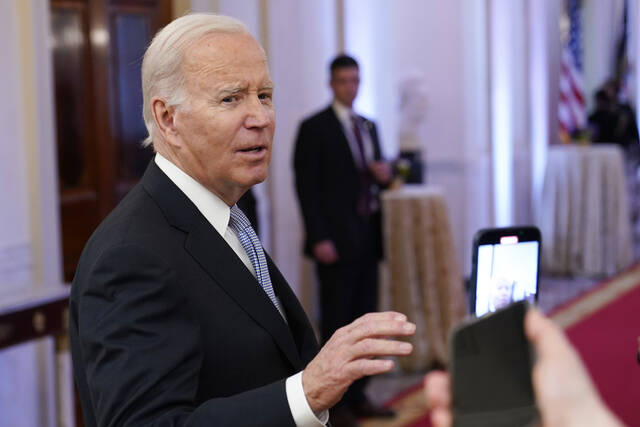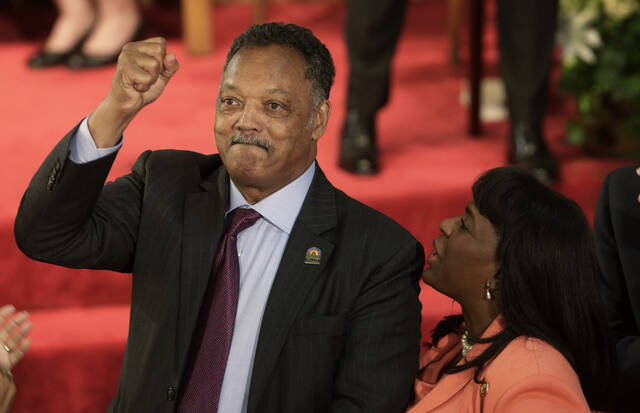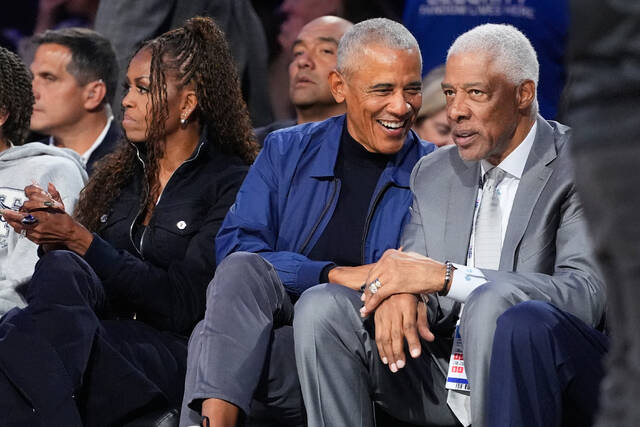WASHINGTON — Sitting aboard Air Force One last year, President Joe Biden was scanning the newspaper and spotted a ghostly photo of a child’s swing set engulfed in raw sewage.
He didn’t just sigh or shake his head. Upon landing back in Washington, he ordered longtime aide Steve Ricchetti to phone the White House infrastructure coordinator.
By August, Lowndes County, Ala., had a $10 million grant to fix the problem with money from the 2021 infrastructure law. And administration officials told the community the money came at the president’s insistence.
But here’s the rub for Biden: A majority of voters in Alabama and across the U.S. don’t believe he cares about people like them. Nor do they trust his ability to manage a sprawling federal government that often moves at a sluggish pace.
This perception has made it harder for Biden to sell his plans for the economy and make his case to voters across the country that he deserves a second term in an all-but-declared reelection campaign.
“If you go and you walk in some of these folks’ yards, the kids are running outside and they’re running in sewage,” says Mitch Landrieu, the White House infrastructure coordinator. “These are the people that the president wants to touch.”
For all of that, however, 53% of voters in the midterm elections said Biden didn’t care about people like them, according to AP VoteCast, a sweeping survey of the electorate. That belief about Biden — a president known to commiserate with grieving families and offer to phone children who want puppies — is a reflection of how people judge leaders through a rigidly partisan lens. About 9 in 10 Republicans say Biden is indifferent to them; roughly that many Democrats see him as empathetic.
“To Republicans, Biden has no redeeming traits,” said Stanford University professor Shanto Iyengar. “Not only are evaluations of incumbents completely polarized, cues like personal traits matter less.”
The broader public also is skeptical that Biden, at 80, can oversee the $6 trillion enterprise that is the federal government. A January poll by The Associated Press-NORC Center for Public Affairs Research found a mere 23% of U.S. adults have “a great deal” of confidence in Biden to effectively manage the White House, down from 44% when he took office.
The president told PBS in an interview last week he thinks polling is irrelevant. But, for the next two years, he’s telling staffers and donors, voters need to get a fuller sense of everything his administration has done, from $35 price caps on insulin for older people to more than 20,000 infrastructure projects in the pipeline.
“It’s really important we let people know what we’ve done — let people know,” Biden recently told donors. They were gathered for a fundraiser in the living room of a posh New York City apartment, but his remarks focused more on the needs of blue-collar workers.
Many voters want leaders who echo their frustration rather than provide policy fixes, said Shawn Parry-Giles, a professor of political communications at the University of Maryland. She noted Biden’s predecessor, Donald Trump, won the presidency by expressing the rage many felt.
“Candidates like Trump seemingly gain traction because they speak to such anger that makes people feel like he understands them,” she said. “Biden doesn’t tap into that anger, but he does try to make inroads through empathy.”
Trump also had the ability to take credit for any successes, claiming strong economic growth when the data suggested it had changed little from Barack Obama’s second term. Kathleen Hall Jamieson, a professor at the University of Pennsylvania, said Biden has not been “as adept at credit-taking” as was Trump.
“If his policies are benefiting the skeptical public, he ought to be able to show them proof of it and, in the process, increase their perception that he cares about them,” she said.
Plenty of presidents have aimed to show empathy for everyday Americans: Obama stressed the 10 letters he read every day from people across the country. George W. Bush offered himself as a “compassionate conservative.” Bill Clinton famously declared during the 1992 presidential campaign, “I feel your pain.”
Biden tries to put himself in the scuffed shoes of a worker and asks Ivy League educated aides to do the same. He repeatedly tells them real people must be able to easily apply for the government resources being created for them.
When Gene Sperling took on the role of overseeing the $1.9 trillion coronavirus relief programs in 2021, the president gave him direct instructions.
“When you are guiding implementation of these programs, I want you, every time, to imagine a couple of parents coming home from a 10-hour shift, trying to make dinner and help a child with homework,” Sperling said Biden told him.
That meant helping in personal ways as well as with broad steps. Sperling worked with Treasury and the IRS to ensure the child tax credit’s monthly payments arrived the same day each month. He told the team it was something of a victory if someone complained on Facebook or Twitter that their payment was late because it meant people knew about the program and valued it.
Those now-lapsed payments pulled child poverty to its lowest level on record. And, when some in Congress suggested the benefits should only be targeted to the poor, the president pushed back. In an Oval Office meeting, he told aides it also mattered for middle-class parents to have a sense of dignity, that they should be able to afford a prom dress or a Little League uniform for their kids.
Biden referenced the frustrations of his father at tax time. Parents got an income-tax deduction for their children then. But, if the parents’ income fell because of a layoff, the value of the deduction also fell.
The president remembered his father asking how it could be fair to give parents less when they were enduring a rough year and needed more help.
Aides tell stories of a president who has made snap decisions based on what he felt people needed, stressing that the government must act with ordinary Americans in mind and make it easier to receive benefits.
After Hurricane Ian struck Florida last year, Biden flew to survey the damage. Homeowners were crowding “insurance villages” to apply for damages, something Biden learned about during his flight. He ordered the head of the Federal Emergency Management Agency to send teams to expedite relief.
Julie Rodriguez, White House director of intergovernmental affairs, said the mandate from Biden was to deliver services and not “allow the guts of government to get in the way.”
In last week’s State of the Union address, Biden said the coronavirus emergency is ending, that “we have broken the covid grip on us.”
But the pandemic still matters for the president. Each day, he continues to tuck a card into his suit jacket that lists the deaths and infections from covid-19, according to aides. He references the numbers in meetings, knowing they represent people and families.
Even with abysmal approval ratings, the best strategy for Biden might be simply to keep doing what he’s doing, giving speeches about what he’s achieved, with lines reporters might have heard before but that seem fresh to local audiences, said William Howell, a professor at the University of Chicago.
“The thing to do is what Biden is doing right now,” Howell said. “It’s really about repetition, not just him saying it over and over again, but his surrogates saying it, and have these messages break through.”























